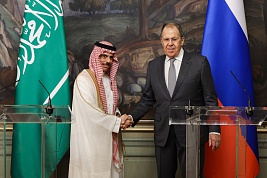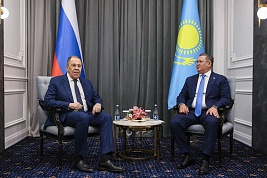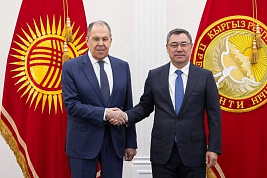Foreign Minister Sergey Lavrov’s remarks at Session II of the XVII BRICS Summit «Strengthening multilateral world order, financial and economic issues, artificial intelligence», Rio de Janeiro, July 6, 2025
Thank you, esteemed President L. Lula da Silva,
Esteemed heads of delegations,
Ladies and gentlemen,
Strengthening the multilateral world order while the international system goes through fundamental transformations is one of the crucial tasks for BRICS and for the entire international community. Multipolarity is not a choice but rather an objective reality which succeeds the outdated neoliberal model that actually builds on neocolonial practices. The traditional paradigm of globalization where the predominant role is played by the so-called developed states of the West is becoming a relic.
Economic crises of recent decades have been the first signs of this model’s malfunctions. The COVID-19 pandemic has exposed countless disadvantages of the global trade and finance system and accelerated its fragmentation. The erosion of the global economic world order has exacerbated as a result of illegitimate unilateral sanctions and use of dollar as a mean of «punishment». The trust in the American currency as a formerly reliable payment instrument was undermined.
Another negative factor is the rapidly growing debt burden. Since 2011 the number of highly indebted states rose from 22 to 59. Today developing countries are spending on debt service more than they invest into their development. The situation is going out of control even in developed states – the US has seen the record level of sovereign debt which reached 37 trillion dollars and it continues to grow.
Therefore, it is not surprising that the global majority is interested in creating development mechanisms independent from the West. Countries of the Global South and East are becoming a main driving force of the global economic growth. Regional organizations such as the African Union, CELAC, ASEAN, SCO, EAEU are playing an increased role. In this context conceptual and practical approaches are being developed to establish a new architecture of world economy based on the principles of equality, multilateralism and non-discrimination in trade, financial settlements, technology, logistics. In the face of the challenges of digitization and AI a special attention is given to human investment.
Nowadays BRICS stands as an engine of such transformation, which seeks to create a more stable global economic architecture based on the principles of universality, transparency, non-discrimination and equal access to available opportunities and instruments. BRICS countries account for more than 40% of the global gross domestic product based on purchasing power parity, and together with partner countries this figure is at 45% or 93 trillion dollars. Today BRICS represents more than 20% of global trade and almost a half of world population.
As a follow-up to the agreements made at the BRICS Summit in Kazan in 2024, we have been working on projects to create Cross-Border Payment Initiative, independent settlement and depositary infrastructure, to develop reinsurance capacity, to increase the effectiveness of special economic zones. The mechanism of the Contingent Reserve Arrangement, including the use of currencies alternative to dollar, is being improved. The share of BRICS countries in trade with Russia is constantly growing and in 2014 it exceeded 48%, with 90% of mutual settlements made in national currencies.
To deliver on these goals it is of significant importance to pursue the reform and depolarization of the Bretton-Woods institutions which should reflect a real state of affairs in the world economy. The continued use of the IMF and WB with a view to preserve neocolonial practices is unacceptable.
The similar situation is unfolding in the WTO as well. Years-long blocking of the WTO dispute-settlement body and introduction of new discriminatory measures against developing countries such as the notorious EU Transborder Carbon Adjustment Mechanism inflict a serious damage to the global trade. In 2024 an informal BRICS mechanism of consultations on WTO was launched which is developing successfully under the Brazilian Chairship. We look forward to an early harmonization of common positions and start of their practical implementation.
The issues of development financing are becoming more and more pressing. According to the UN, its deficit is estimated at 4,2 trillion dollars per year. If the current trends prevail, more than 600 million people will live in extreme poverty by 2030. Without sufficient funds and being unable to take out credits on acceptable conditions, countries of the Global South have to rely on official development assistance. Given the Western double standards, its provision depends on political considerations. For example, in 2023 the IMF approved an unprecedented credit for Ukraine worth 15,6 billion dollars (577% of Ukraine’s country quota). It makes up more than a third of annual volume of all IMF programs. Since the beginning of 2022 the World Bank has pledged to allocate nearly 54 billion dollars for Ukraine. In total these sums allocated to Ukraine are twice as much as annual volumes of assignations allocated by the Bretton Woods structures to all countries of Africa.
The increasingly aggressive attempts by the West to introduce ideological ultimatums into the dialogue as what are virtually the main criteria – based on Western interpretations of human rights and democracy – are having an extremely negative impact on the delivery of the UN sustainable development goals.
To address imbalances and to mobilize resources for development Russia introduced an initiative to create within BRICS a New Investment Platform with the participation of the New Development Bank (NDB). We thank colleagues for showing their interest to the promising initiative. Its implementation will be facilitated by our joint efforts to turn the NDB into an innovative development institution that is oriented towards the needs of its own stakeholders and that is not subject to the influence of external conjuncture. Increasing the number of stakeholders will strengthen the potential of this mechanism and contribute to the expansion of its geography of operations. We highly appreciate the efforts of NBR President D. Rousseff in this direction.
Artificial Intelligence is becoming a critical technology. Experts estimate that AI contribution to the global domestic product will be at 20 trillion dollars by 2030.
We will need to address issues related to ensuring universal access to advance developments in this field. Secret initiatives put forward by a number of countries and with restricted participation with a view to promote non-consensus approaches are fraught with the most serious consequences. The attempts to artificially isolate sovereign States from global processes are extremely dangerous and doomed to failure. A response to such attempts was the harmonization of the BRICS Joint Statement on Global Governance in the field of Artificial Intelligence which reflects our common position regarding the central role of the UN in developing universally recognized regulation mechanisms in this field.
The challenges associated with the development of digital technologies are transnational in nature and require collective response. The prime example is the adoption of the UN Convention against Cybercrime in 2024 which will be opened for signing in October in Hanoi.
I am convinced that BRICS States together with like-minded countries will continue to lead in promoting a just multipolar world order that will provide favourable conditions for sustainable development of all States without exception. In this work we receive assistance from BRICS Business Council and BRICS Civil Council, Women’s Business Alliance, to which I would like to express my appreciation and wish them every success.





